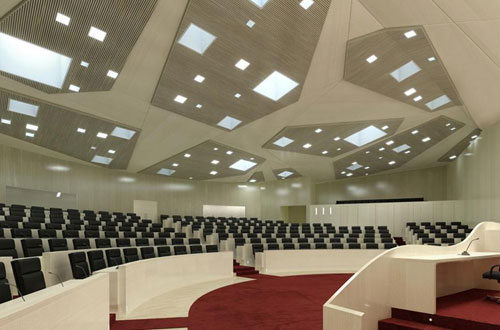| Saakashvili on Proposed Increase of Number of MPs |
| Civil Georgia, Tbilisi / 27 Jul.'11 / 12:35 |

A model of new chamber of the Parliament inside the planned glass dome building in Kutaisi, which will house the Parliament elected in 2012. If the electoral reform deal is passed with its current form there should be at least 190 seats in the new chamber of the Parliament in Kutaisi.
President Saakashvili said on July 26, that he personally was not in favor of increasing number of lawmakers as part of the electoral reform deal, but his party had to agree on the proposal as part of “a compromise” with opposition.
He said reaching an agreement with “key opposition parties” on electoral system reform on June 27 was an important political breakthrough.
“Upon the demand by the opposition, we have agreed on what I am personally not very much in favor of – increasing number of lawmakers. I do not like it, but changing electoral system was the opposition’s one of the major demands,” he said while responding a question asked during the joint news conference with his Polish counterpart, Bronislaw Komorowski, in Batumi on July 26.
The ruling and opposition parties were in talks over electoral system reform since November, 2010. Not a single written proposal publicly tabled by the opposition in the process of those negotiations envisaged increase of number of MPs. The idea first floated in March, 2011 when the ruling party put forth its proposals over electoral system reform; a modified proposal, tabled by the ruling party in late June again envisaged increasing number of MPs from current 150 to 190. That latter version was eventually agreed with some opposition parties with some others refusing to join the deal.
“I know that the political party of my friend, my colleague [referring to the Polish counterpart] in Poland is demanding reducing number of lawmakers. Unfortunately, opposite has happened in Georgia… So if you reduce number of MPs, we will only envy you,” Saakashvili said.
“It was our compromise to the opposition, because we want such an electoral system, which would secure… legitimacy of [election] results and which will maximally reflect interest of the entire spectrum of the society,” he said. “In the difficult geopolitical situation in which we are now today, democracy is kind of a shield for us. We have media pluralism, so Georgians do not depend much on foreign television channels… We have well-developed political class, which is also a serious protection against destabilization from within Georgia.”
The ruling party’s proposal to increase number of lawmakers, accepted by some opposition parties, however, is facing a legal hurdle, opponents say, because downsizing number of MPs was first endorsed through referendum in 2003 and this decision can only be revised through a new referendum. The ruling party and some opposition parties, which have joined the electoral reform deal, have rejected those arguments, saying that the Parliament can amend constitution without holding a new referendum.
President Saakashvili himself was a strong supporter of reducing number of lawmakers to 150. In his annual address to the Parliament on February 10, 2005 Saakashvili called on the lawmakers to pass constitutional amendments putting number of MPs in line with the 2003 referendum decision.
“2,300,000 voters said [in 2003 referendum] that the number of MPs should be no more than 150 and if we fail to implement this, it will be humiliation of these voters,” Saakashvili said on February 10, 2005.
Seven days later, on February 17, 2005, the Parliament endorsed a constitutional amendment downsizing the Parliament. On that day, President Saakashvili said: “I am glad that the Georgian Parliament, all the factions, supported the reduction of [number of] MPs from current 235 to 150… Georgia has a Parliament, which listens to its own people.”
In March, 2008, amid debates over the electoral system, Saakashvili suggested possibility of increasing of number of MPs at the expense of adding additional seats elected through party-list, proportional contest. He, however, stressed at the time that revision of the 2003 referendum result would only be acceptable in case of a broad cross-party consensus.
“You know that the referendum said there should be 150 lawmakers, but if this [increase in the number of MPs] leads to national accord and consensus among the parties, we are ready to explain to the people that it is worth doing it. But it can only happen if all the political parties agree to it,” Saakashvili said on March 18, 2008.
